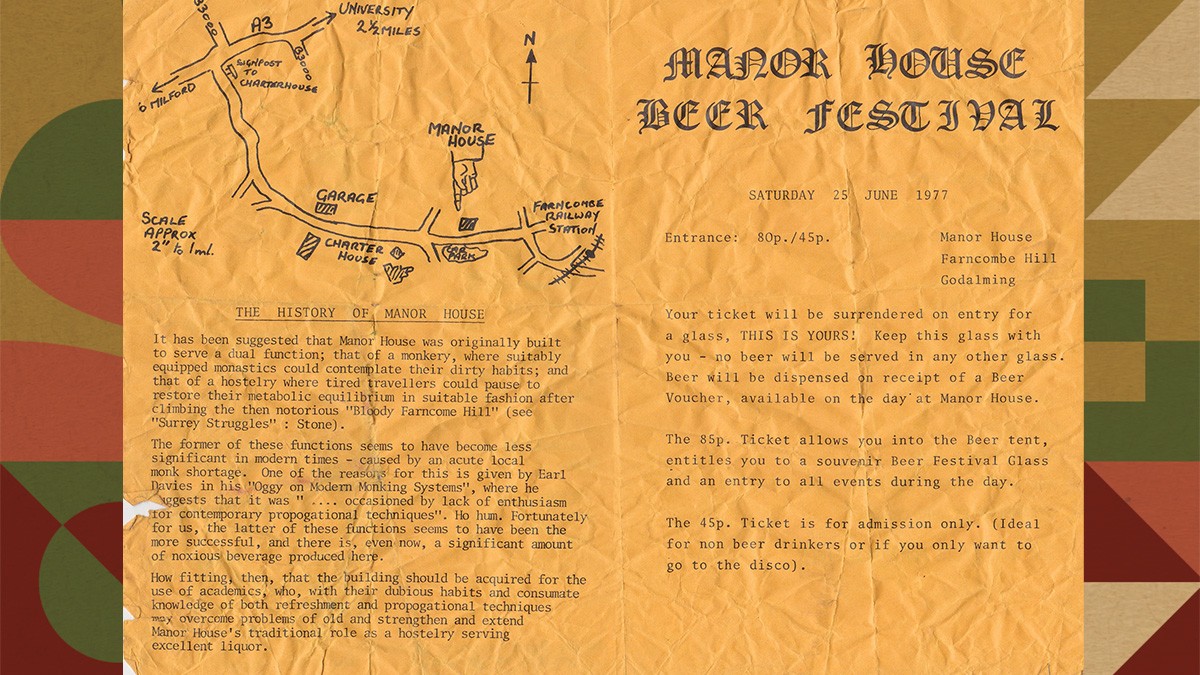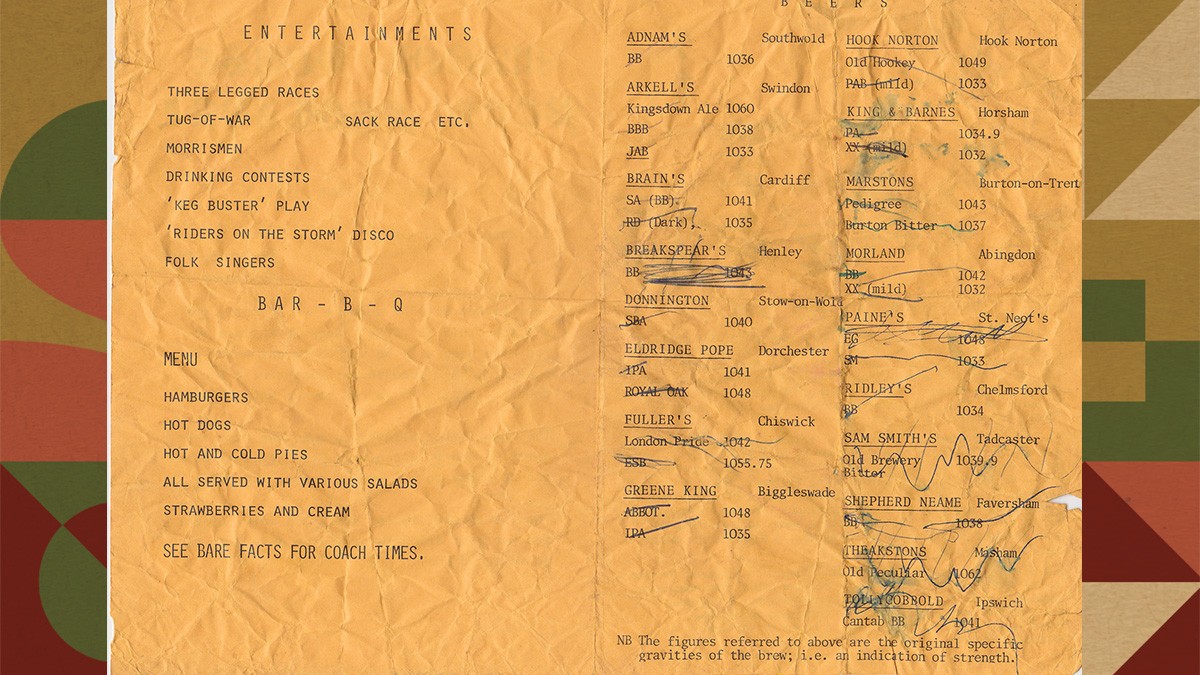“Baked bean wrestling at the Manor House Beer Festival was particularly vile!”
Londoner Mike Locke opted for a more sedate pace of life in Guildford to study a BSc Physics at the University of Surrey from 1976-1979. But he remembers stress setting in when he was asked to write and stage the RAG Review… in four weeks!
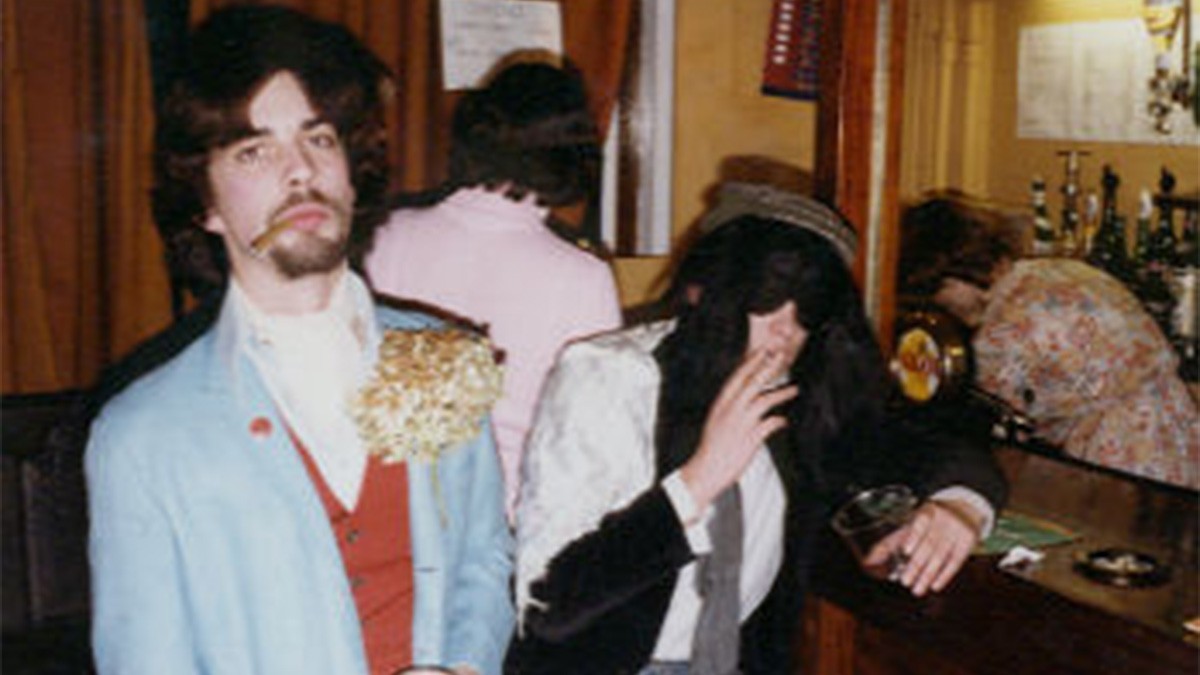
Mike looking dapper during his student days
Why did you come to Surrey?
I didn’t get into Cambridge, so I applied to York, Sussex and Surrey because they were strong on sciences and physics. I remember thinking York felt a bit too big. Something about Surrey felt just right and choosing to study in Guildford was an excellent decision.
What was it like to study at Surrey?
The main University and campus were more or less established. Guildford Court had just opened up and Hazel Farm was being built. From the original Stag Hill Court all the way down to the railway line was all greenery.
The fact it was a campus university was a key selling point. Having guaranteed digs in your first and third years was another. The capacity to take an industrial year was also important. The course was based on continuous assessment, which was a bonus after having to take exams all the time.
It was exciting to finally be able to focus on your chosen subject. You were treated as an adult and getting a proper education from amazingly qualified people. It felt like a big step up.
Was Daphne Jackson at Surrey then?
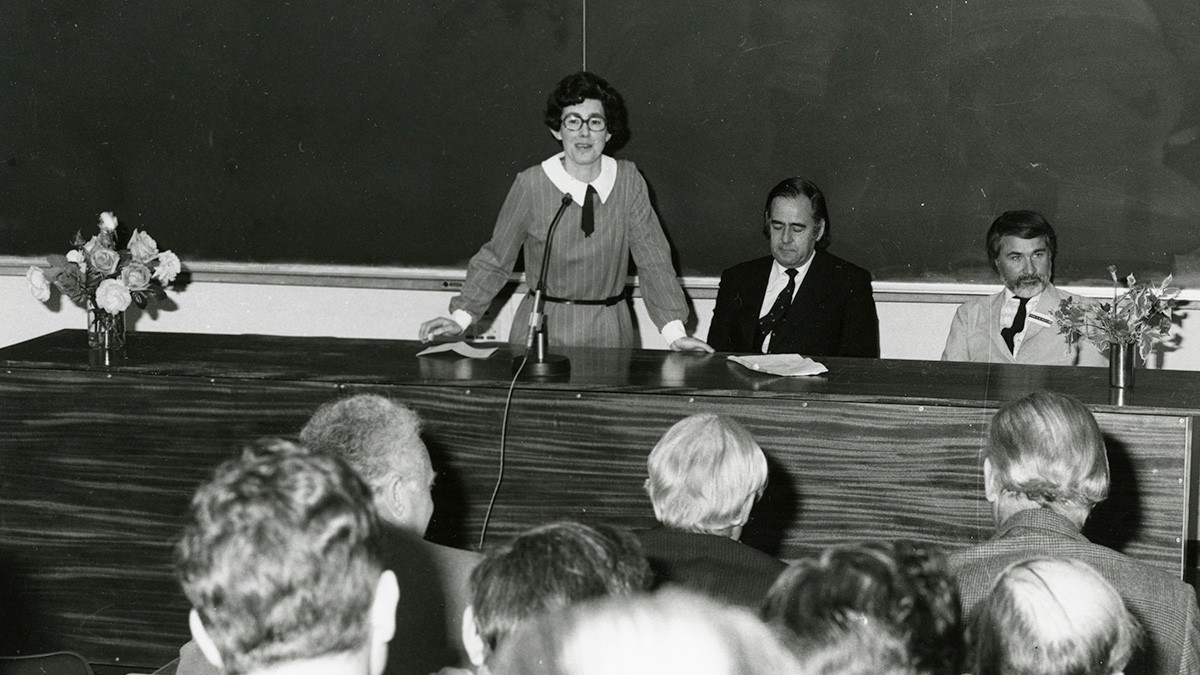
Professor Daphne Jackson lecturing students at Surrey
Yes. She was a strong person who left a lot of good memories. My wife was also a physicist and she was one of her favourite people.
Was her status as the UK’s first female Professor of Physics important?
It was. The Department of Physics had an amazing woman and one of the foremost physicists in the UK leading its research. It sometimes feels like society has gone backwards since then. There was a drive for a more egalitarian world, with a sense of a fairer society going on. It felt tremendously positive and forward-looking.
There was a lot of student activism and engagement going on, too. We campaigned against the increase in fees for overseas students, and the rent strike happened the year before and students occupied Senate House chamber and the phone exchange. We targeted the latter because it meant there could be no phone calls going in or out of the University. That’s also where I learnt to play brag.
What were the best bits of the course?
The computing part was excellent. We had a computing lab and I think we had a PDP11, which was a time-shared mainframe. At school, we had a computing club where we hole-punched cards, then sent them off to the University of Southampton to be fed into their computer and run overnight during their downtime. To come to Surrey and join a department that had its own computer was very leading-edge. This was way before anything you’d recognise as a computer today with a built-in trackpad, keyboard and screen.
Did you enjoy your time as a student?
Absolutely. Probably a bit too much.
Did you live in student accommodation?
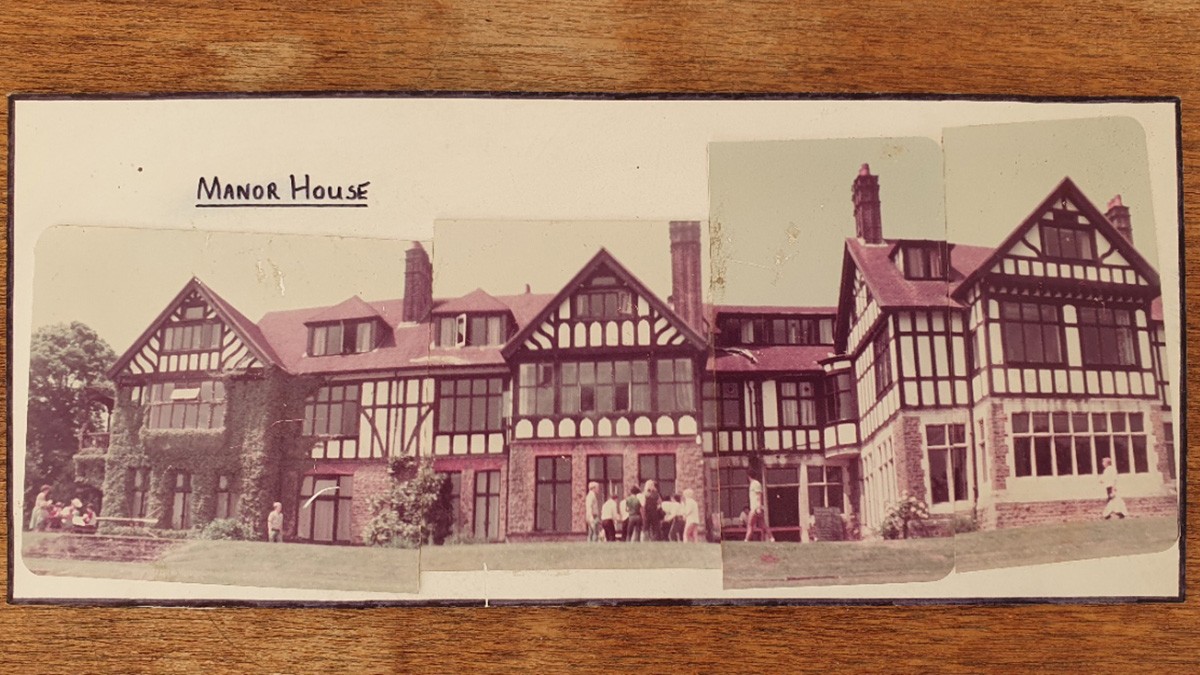
Mike says that Manor House was a big step up in student accommodation
I lived in Cathedral Court 2B9 in my first year and the social aspect was fun. I lived off-site in my second year, which was an appalling experience.
In my final year, I was lucky enough to get into Manor House, which was amazing. It looked like a medieval manor house and the myth was that it was a replica put up by a Victorian merchant trader. The story was that he bought the wood panelling and staircase at an auction where a country house was being sold off, then he got his architects to build him a house that would go with the panelling and staircase. It was much more luxurious when compared to any other student accommodation. It also hosted one of the biggest social events of the year in the Manor Park Beer Festival.
Can you tell us about that?
In the mid-1970s, we were right at the start of the whole real ale era. Even the upper and lower bars of the Students’ Union had a couple of barrels of Courage Best on tap.
At the Manor Park Beer Festival, attendees came and had to buy books of tickets, which they’d exchange for beer. Some of the braver attendees tried to sample every single drink there, which was an amazing feat when you think they had 20-plus beers available. It was an all-day event and there were entertainments on, too. There was a good folk club at the University and people from there performed at the Festival. The notorious Stag Hill Morris were also regular attendees. There was a ladies set of dancers, too.
Hari Sullivan, the larger-than-life and nattily dressed manager of the catering outlets and bars, eventually took it over and it moved onto campus.
In 1979, I ran the traditional Silly Games at the Manor Park Beer Festival. The fun included the sack race, the wheelbarrow race, a yard of ale race, apple bobbing, tyre throwing, greasy pole and tug-of-war.
There was also jelly-sucking, where participants had a pint of jelly they had to suck through a straw, and baked bean wrestling, which was absolutely vile. Two people were particularly keen on the latter and they were keen to show off their prowess. During one RAG takeover of Guildford High Street, they even had a bout there.
Did you take part in any clubs?
I was involved in the RAG Society and I ended up writing a couple of the RAG Review shows. I didn’t intend to write the first one, but the guy who was supposed to be doing it kept promising us the scripts but never delivering them. We were stalled week by week… Then four weeks before the performance date, he withdrew with no sign of any script. So we wrote it, cast, rehearsed and staged the RAG Review in four weeks flat. It was the year of Star Wars and we staged a parody called Bar Wars.
We had Bare Facts, too. A lot of the sexism that existed in earlier incarnations had gone by this point. It wouldn’t have been entertained. We also had the Socialist Women’s Group who kept any rampaging males or sexists in order.
Did you attend many student gigs?
I was involved in the stage crew and the main attraction of that was getting into the gigs for free. I saw Iron Maiden on one of their first tours, plus Motorhead, Hawkwind and the Stranglers. The latter walked off stage halfway through their first song. The reason for this was that there was a series of shows on BBC2 called Rock Goes to College and they’d come in to film The Stranglers for it. Because it was a BBC production, they’d handled all the tickets and there was some ill feeling about this from the band. So they played half a song, swore a bit and walked off stage in protest. The replacement group the following week was the Average White Band. They were nowhere near as exciting!
One band that went down a storm was the 1950s doo-wop band, Darts. They played at Surrey when another band, John Mayall and the Blues Breakers, cancelled on the afternoon of the gig. Fortunately, the Ents Secretary, Robin Whittaker, knew Darts were rehearsing locally and he asked them if they fancied playing at the University that evening. They rocked up and it was a cracking gig, with frontman Den Hegarty leaping all over the stage and climbing up speaker stacks. They returned for a few other gigs and they also performed at Surrey Free Arts Festival.
Osibisa, a Ghanaian-British-Afro rock band, were also great. They had this amazing backdrop designed by Roger Dean, who did all the artwork for Yes, and it got nicked. John Martin also played and there were lots of students throwing “aromatic cigarettes” on stage for him to enjoy.
What was Guildford like?
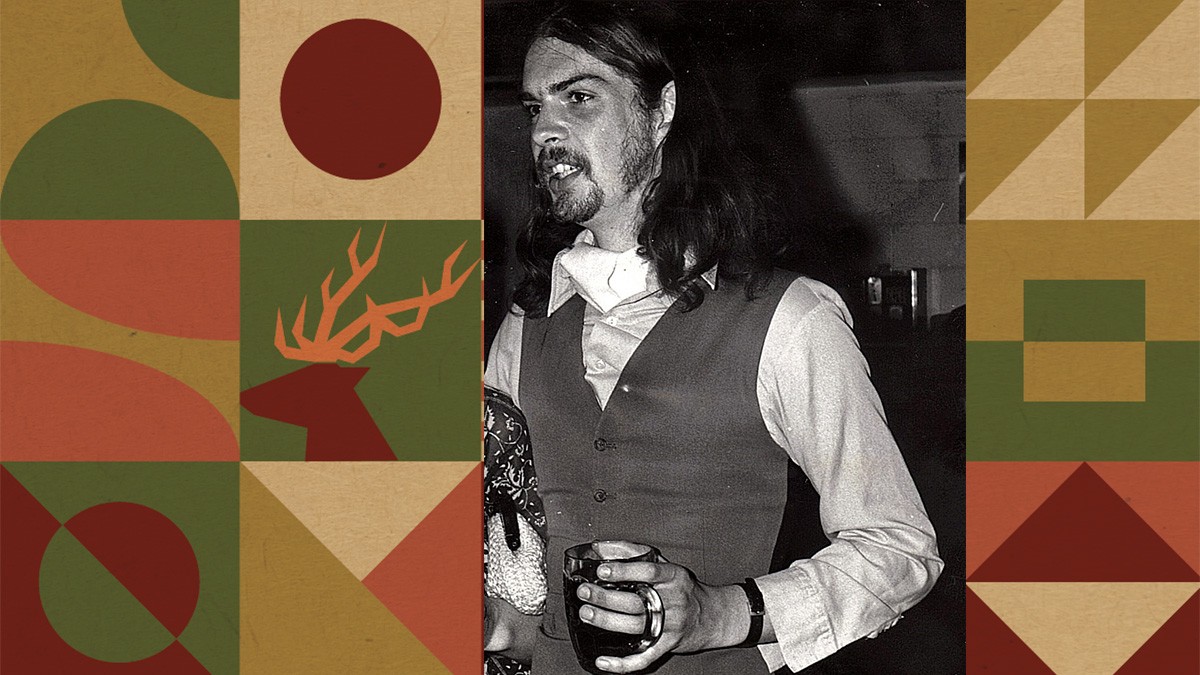
Mike fitted in working at The Rat's Castle alongside his studies and his student activities
We ventured in to do some shopping, and visit the restaurants and the pubs. The Two Brewers, The King’s Head and The Rat’s Castle were good places. I used to clean the pipes at The Rat’s Castle because the guy who ran the RAG Review, Phil Marshall, used to drink in there. He took me in and we drank beer that had stuff floating in it. The landlord admitted he never cleaned his pipes, so I offered to do it for him every week for a few free beers. There never seemed to be any major divide between town and gown.
By that time, I was also working in the bar at the Students’ Union. I remember working there on Saturday nights when they had late extensions and it being five deep and ridiculously busy.
Thankfully, I managed to avoid the four-legged beer race, which involved mixed teams of three people taking a route around hostelries in the town and having to drink a half in each of the pubs on the course, before returning to the Students’ Union for the final drink of the night. It was more fun to watch than take part.
What are your highlights at Surrey?

Mike (fourth from right) with his colleagues in the Students' Union Lower Bar
I made life-long friends who I’m still in touch with today. One of them was my best man. I also met my wife, who was on my course.
The other thing that sort of stuck was the student activism. At the time, we were one of only two unions in the country that was run via general meetings. These happened twice a week and it was how decision got made. That interest stuck and led to a role as a parish councillor at one point.
Another thing that also stuck was making and producing our own entertainment after being involved with RAG, Ents and the Folk Club. I also stood for the Presidency of the Students’ Union with the slogan, “Get alert! The world needs lerts!” I didn’t get in, but I did a stint as Deputy President.
What did you do when you left?
I worked in technically oriented marketing for Seiko, who were based in Walnut Tree Close in Guildford. I had a summer job and I carried on working there. I went back to college to do a marketing degree and I became part of their marketing team. This was back in the day when we were trying to explain how quartz watch technology worked. That led on to working in sports time-keeping.
I often tell people I did the London Marathon five years running… working as part of the time-keeping team.
We did other big sporting events at the time, too, such as Horse of the Year Show.
After that, I worked at Kawasaki, which was a delight as I’m a biker. Then I worked for Amstrad and, because we worked closely with the industry that made satellite receivers, I got a job working at Astra, which broadcasts Sky.
I ended up running a satellite ISP company that connected satellites with those who needed to broadcast signals. For the last six years, I’ve been working with the trade association for broadband providers who aren’t British Telecom.
The fascination with computers that was nurtured at Surrey led onto all these other things, even though I dropped out of my degree and never finished it.
Did your time at Surrey influence your career?
It was very important. It taught me how to think and how to learn. It helped me transition into an adult, even though I tried to keep adolescence going beyond all reasonable limits.
What advice would you give the undergraduate version of yourself?
Don’t drop out! Ironically, all the extracurricular activities meant all my continuous assessment work was lousy. I passed my part twos, but I didn’t have enough continuous assessment work to go into my third year.
I’d sit myself down and give myself a stern talking-to and say something along the lines of, “Get your act together. You have no idea how easy you have it with a full grant compared to what’s coming for future generations!”
